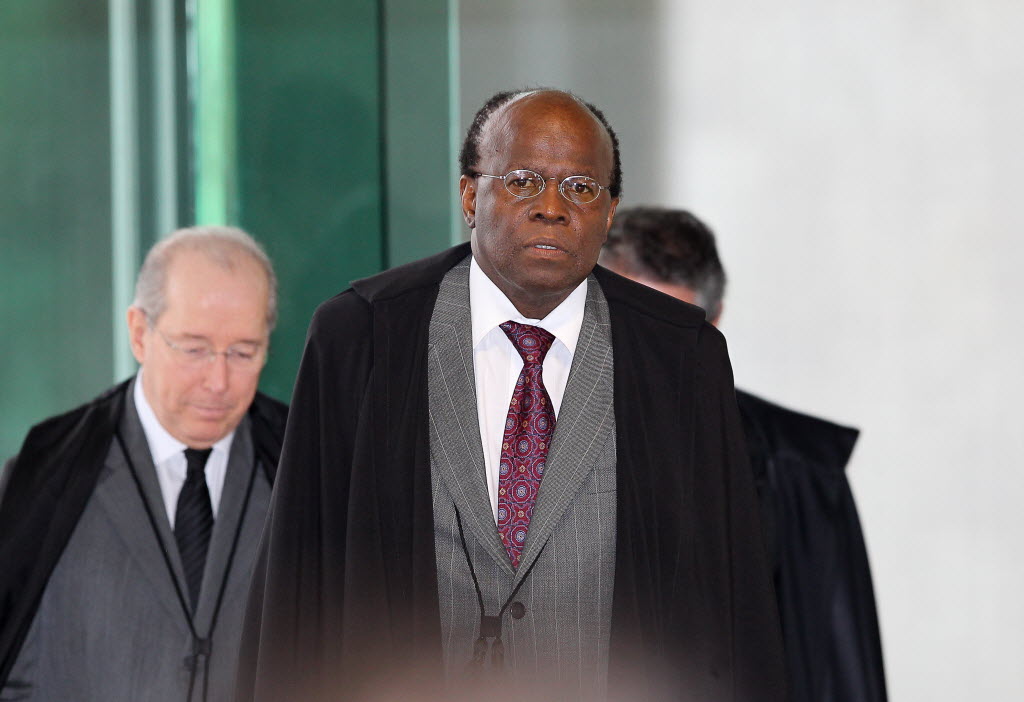Joaquim Barbosa, the new authority in Brazilian justice.
Mensalão, The PCC, and Caso Bruno – the messy reality of Brazil’s justice system has dominated news recently. Despite obvious problems, some things seem to be improving.
Last week, the Brazilian Minister of Justice said he would rather die than do time in the Brazilian prison system. José Eduardo Cardozo called jail conditions “medieval” and said that “Those that commit small crimes end up coming out major criminals.”
This is a startling admission for any major public figure, and echoes what a local judge told us earlier this year. But since then the issue of prisons has moved to the front and center of Brazilian news. First, because some of the highest-ranking officials in President Lula’s administration may actually be jailed for corruption, in a development many see as very positive for the country. Second, because São Paulo seems to find itself in the grips of a deadly war between police and the PCC, a criminal gang born in the country’s jails. And third, because the grisly details around the trial of a famous footballer have dominated headlines again.
Mensalão – We got news last week that the high-level politicians involved in the 2003-2004 vote-buying scandal may actually go to jail. That includes José Dirceu, Chief of Staff during Lula’s first presidency. This has been seven years in the making and the surprisingly tough justice handed down by the Supreme Court has delighted those who have been pressing the case (including much of the media), and has made Justice Joaquim Barbosa a hero to much of the country. He has been named the first black head of the Supreme Court.
Here’s how it worked: high-level politicians have been convicted of using public funds to pay legislators big monthly sums (thus, “mensalão”) to vote along with the ruling coalition. Corruption of this type in the country was not new, of course. Folha famously published reports that Fernando Henrique Cardoso’s bid for re-election relied on bought votes.
In private conversations, a couple of PT supporters have recently expressed a fascinating, counter-intuitive take on the affair: they believe that Dirceu and others were right to do what they did, and that it is good for the country that they are punished. In this reading they condemned to be sacrificial lambs.
I am paraphrasing heavily:
Everyone knows that without a stable coalition your government falls apart immediately. In the long run it was worth paying those men, who were basically extorting the state, 10,000 dollars a month in order to keep a government in power that managed to pull 40 million people out of poverty and put Brazil on the global stage. The alternative would have been to take on the existing corrupt power structure in Brasília, and probably lose.
But it’s good if that that kind of deal-making is no longer tolerated and if the Supreme Court has a chance to send that message now, the crooks in Brasília will be less able to do things their way in the future.**
That this seemingly contradictory position (Good for Dirceu! Send Dirceu to jail!) is a possible, even understandable one, is testament to the bizarre workings of Brazilian politics until recently. Now that Dirceu has been sentenced, there is much hope things are getting better. And as for the PT, being dragged through this scandal didn’t hurt it too much in this year’s elections.
But the possibility of a well-to-do, respected public figure having to set foot inside a terrifying Brazilian prison isn’t the only thing bringing jails to the center of attention. That’s also where the PCC was born.
War in São Paulo
This year, it seems war has erupted between the Military Police and the PCC, São Paulo’s dominant criminal gang. The Primeiro Comando da Capital is suspected of killing at least 90 police officers, which has either generated, or taken place against, a surge in violence.
The PCC burst into the consciousness of middle-class Brazil in 2006, when they coordinated a wave of attacks on police and brought the city to a standstill. The widely accepted explanation for the attacks was a conflict over conditions in São Paulo’s prisons. We’re not quite sure how, but a five-year peace was established between police and the gang that fell apart earlier this year. More continue to die as the city waits and hopes for some meaningful solution to the conflict. Little is known for sure as to what is really behind it.
This is a terrible war and a huge step in the wrong direction. But those of us living in central São Paulo haven’t felt so directly affected (that dubious honor goes, as always, to the poor living on the outskirts), and all things considered, things are still much better than they were not so long ago in South America’s largest city.
Caso Bruno
A famous footballer reportedly murders his pregnant lover and feeds her body to dogs. It’s a case custom-made to be splashed across the headlines. He is now being tried. If he is convicted, he’ll also find out just how the Brazilian justice system works on the inside. That’s one place where things are likely just as bad as ever.
*This is NOT the official position of the Worker’s Party or any high-level PT operative.
**And another curious thing I heard: “There are two kinds of corruption. Stealing from the state to line your pockets, or being forced to deal with crooks to achieve social or political goals. At least the PT was involved in the second rather than the first.”


